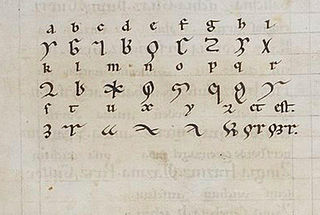
Hildegard of Bingen, also known as Saint Hildegard and the Sibyl of the Rhine, was a German Benedictine abbess and polymath active as a writer, composer, philosopher, mystic, visionary, and as a medical writer and practitioner during the High Middle Ages. She is one of the best-known composers of sacred monophony, as well as the most recorded in modern history. She has been considered by scholars to be the founder of scientific natural history in Germany.
Benjamin Bagby is an American singer, composer, harpist, and performer of medieval music.
Viriditas is a word meaning vitality, fecundity, lushness, verdure, or growth. It is particularly associated with abbess Hildegard von Bingen, who used it to refer to or symbolize spiritual and physical health, often as a reflection of the Divine Word or as an aspect of the divine nature.

A lingua ignota was described by the 12th-century abbess Hildegard of Bingen, who apparently used it for mystical purposes. It consists of vocabulary with no known grammar; the only known text is individual words embedded in Latin. To write it, Hildegard used an alphabet of 23 letters denominated litterae ignotae.

Disibodenberg is a monastery ruin near Staudernheim in Rhineland-Palatinate, Germany. It was founded by Saint Disibod. Hildegard of Bingen, who wrote Disibod's biography "Vita Sancti Disibodi", lived in Disibodenberg for 39 years.
Sequentia is an early music ensemble, founded in 1977 by Benjamin Bagby and Barbara Thornton. The group specializes mainly in Medieval music. Sequentia focuses particularly on music with texts, specifically chants and other stories with music, such as the Icelandic Edda. They are interested in the interplay between drama and music, and sometimes do partially staged performances, such as that of Hildegard of Bingen's Ordo Virtutum. Bagby and Thornton have both been active in original research on the projects they perform.

Eibingen Abbey is a community of Benedictine nuns in Eibingen near Rüdesheim in Hesse, Germany. Founded by Hildegard of Bingen in 1165, it was dissolved in 1804, but restored, with new buildings, in 1904. The nuns produce wine and crafts. They sing regular services, which have been at times recorded. The church is also used as a concert venue. The abbey is a Rhine Gorge World Heritage Site.
Ordo Virtutum is an allegorical morality play, or sacred music drama, by Hildegard of Bingen, composed c. 1151, during the construction and relocation of her Abbey at Rupertsberg. It is the earliest morality play by more than a century, and the only medieval musical drama to survive with an attribution for both text and music.

Saint Bertha of Bingen was the mother of Rupert of Bingen. Her biography was written, and subsequently her cult popularized, by Hildegard of Bingen, who lived in the same region, about four hundred years later. Bertha and Rupert share a feast day on 15 May.

Scivias is an illustrated work by Hildegard von Bingen, completed in 1151 or 1152, describing 26 religious visions she experienced. It is the first of three works that she wrote describing her visions, the others being Liber vitae meritorum and De operatione Dei. The title comes from the Latin phrase Sci vias Domini. The book is illustrated by 35 miniature illustrations, more than that are included in her two later books of visions.
Barbara Thornton was an American singer, musicologist, and groundbreaking performer of medieval music.

This is a discography of Hildegard of Bingen's musical works.

Vision is a 2009 German film directed by Margarethe von Trotta.
Alba are a Danish medieval music ensemble founded in 1992. The ensemble consists of the duo Agnethe Christensen and Poul Høxbro, or the trio with the harpist Helen Davis.
The Ensemble für frühe Musik Augsburg is a German early music ensemble founded in 1977 and specializing in medieval music. The ensemble is regarded as "renowned" in Germany.
Pamela Dellal is an American mezzo-soprano in opera and concert, a musicologist and academic teacher. She has performed classical music from the medieval Hildegard von Bingen to contemporary. She is on the faculty of the Boston Conservatory, Brandeis University, and the Longy School of Music of Bard College. She is known for having translated all texts that Johann Sebastian Bach set to music.
Canticles of Ecstasy is an album of sacred vocal music written in the 12th century by the German abbess Hildegard of Bingen and recorded by the early music ensemble Sequentia that was released by the Deutsche Harmonia Mundi recording label in 1993.

Barbara Stühlmeyer OblOSB is a German theologian, musicologist, author, especially a Hildegard scholar and a science journalism.

The Dendermonde Codex or sometimes called Villarenser Kodex or codex 9 of Dendermonde Abbey, is a valuable manuscript containing the Symphonia harmoniae caelestium revelationum of Hildegard of Bingen.
The Hildegard von Bingen Prize for Journalism is an annual journalism award. Since 1995, it is awarded by the Board of Trustees of the Hildegard von Bingen Prize. Former award winners are members of the Board of Trustees. The award was founded in 1995 by the biographer and journalist Helmut Ahrens. A publicist is honored "for an outstanding, professionally and culturally important journalistic individual achievement or a life's work." The prize money is €10,000. The prize is awarded in Mainz. The award is named after the medieval abbess Hildegard von Bingen. The abbess was convinced that writing and word have their own effect.










